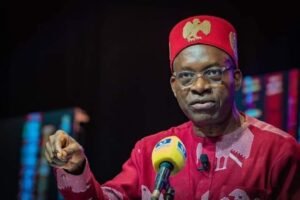
Anambra State Governor, Professor Chukwuma Charles Soludo, CFR, has urged Nigerians to move beyond ethnic and religious divisions and embrace a national dialogue to redefine citizenship, residency, and identity in the country.
Speaking at The Platform, a national discourse event organized to mark Nigeria’s Democracy Day in Lagos, Soludo emphasized that the future of Nigeria depends on dismantling religious and ethnic bigotry that has undermined national unity for decades.
“As a country, we must design conscious programs to kill religious and ethnic bigotry,” Soludo said. “We need a national conversation around citizenship versus indigenship versus residency. Can we create a Nigeria where ‘state of origin’ or religion will no longer be a defining basis to participate or benefit from the public space?”
The former Central Bank Governor argued that Nigeria cannot build a new national identity when people are constantly reminded that, regardless of how many years or generations they have lived, worked, or paid taxes in a place, they are still considered outsiders because of their ancestral roots.
To address this, Soludo proposed the establishment of a Bureau for handling grievances against the Nigerian state as part of institutional reforms to foster national cohesion.
“We need ongoing, open, and constructive dialogue,” he stressed, insisting that nation-building is a continuous process that requires deliberate effort.
Soludo cited Anambra State as a model of deliberate inclusivity, where his administration operates with the guiding philosophy of “One State, One People, One Agenda.”
According to him, programs and projects are prioritized based on need and impact rather than sectional or religious considerations. “The five new general hospitals we have completed in three years are all located in the North senatorial zone — the zone of my immediate predecessor — and not in my southern zone,” he explained.
He also highlighted the massive urban regeneration project at Okpoko, near Onitsha, which is located in the same North zone, describing it as one of the most ambitious renewal efforts in the state’s history.
On religious unity, Soludo noted that his administration has successfully reduced denominational tensions among Christians. His efforts earned him the title of “Father of Ecumenism” by the Christian Council of Nigeria (CCN), a recognition also supported by the Pentecostal Fellowship of Nigeria (PFN).
In terms of appointments and recruitment, Soludo revealed that his administration recruited 8,115 new teachers and over 1,000 medical professionals from 18 states across Nigeria. Additionally, his appointees include individuals from Abia, Osun, Kogi, Ebonyi, Imo, Delta, and Enugu states.
“We must intentionally mainstream One Nigeria with One Destiny,” he asserted. “It may be subtle but is a powerful way to create true Nigerians.”
Soludo also pointed to the Yoruba model of religious tolerance, where family members may belong to different faiths yet coexist peacefully. “Such a level of religious tolerance should be a template for the next Nigeria,” he said, commending President Bola Ahmed Tinubu as a leader who exemplifies that spirit.
As Nigeria marked 25 years of uninterrupted democratic governance, Soludo’s message at The Platform resonated as a strong call for national rebirth anchored on unity, fairness, and a renewed sense of belonging for all Nigerians.



